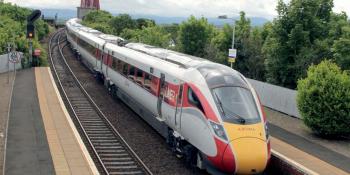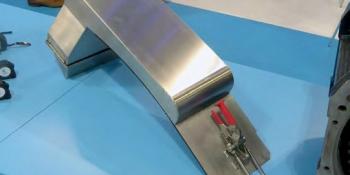EAST MIDLANDS Trains has invited tenders for Persons with Reduced Mobility (PRM) work on its fleet of HSTs.
The sets had been destined for replacement before the deadline for PRM compliance at the end of this year, but the partial cancellation of Midland main line electrification and subsequent delays to the franchise process have put paid to this prospect. EMT currently operates eight full length 2+8 sets, owned by Porterbrook, plus three 2+6 sets, owned by Angel, which were drafted in last year from Grand Central as a result of a loss of efficiency in last May’s timetable change due to a requirement to accommodate additional Thameslink services on the line south of Bedford.
In a letter to House of Commons Transport Committee chair Lilian Greenwood, EMT Managing Director Jake Kelly explains: ‘The Department for Transport has asked us to undertake on their behalf a tender process and commence a programme which works towards addressing some of the High Speed Train (HST) fleet’s PRM non-compliances. We understand that the Department for Transport continues to expect a new franchisee to introduce new rolling stock which will ultimately ensure that the main line fleet is fully PRM compliant.’ It is understood EMT was expecting tenders back by the end of April. The work will not include fitment of power doors, as is taking place to sets being retained by ScotRail, CrossCountry and Great Western Railway, largely because the work is only designed as a short life extension, with replacement planned in the next franchise as new operator Abellio introduces new bi-mode inter-city trains (p9).
Work will include various other modifications to ensure compliance, including provision of selective door opening (SDO), accessible toilets, passenger information displays and emergency lighting. It is understood EMT has included the fitment of controlled emission toilet (CET) tanks as an option within the tender; as in previous instances where these have been fitted to Mk 3 coaches, the extra weight this adds would mean only one tank could be fitted per vehicle. The industry has set an informal deadline of removing toilets which dump waste onto the track by the end of this year, although this is not formally part of PRM compliance.
With no possibility of completing the work by the end of this year, a dispensation against PRM regulations will be needed to enable the fleet’s continued operation into 2020. A further challenge will be scheduling the work, as EMT does not have a full spare set available, with a recent lengthy C6 overhaul of the Mk 3 coaches requiring small numbers of vehicles to be out of service at a time. It is therefore likely that EMT will look to draft in an additional HST to its fleet, with the set on permanent hire to LNER for Leeds and Hull services thought to be a likely candidate; the Neville Hill-based diagram NL65 operated by this set is due to switch to Class 800 operation when LNER introduces its first bi-mode Azuma set in May.
A further challenge for the new franchisee is that EMT has 21 Class 153 DMUs, with these single-car units also not PRM-compliant and regularly operated individually, rather than coupled to other compliant units as is often the case elsewhere. Arranging a suitable cascade of compliant diesel vehicles by the end of this year is likely to be challenging, and dependent on deliveries of new trains to other operators. PRM work on EMT’s Class 156 and 158 DMU fleets is now well underway.




